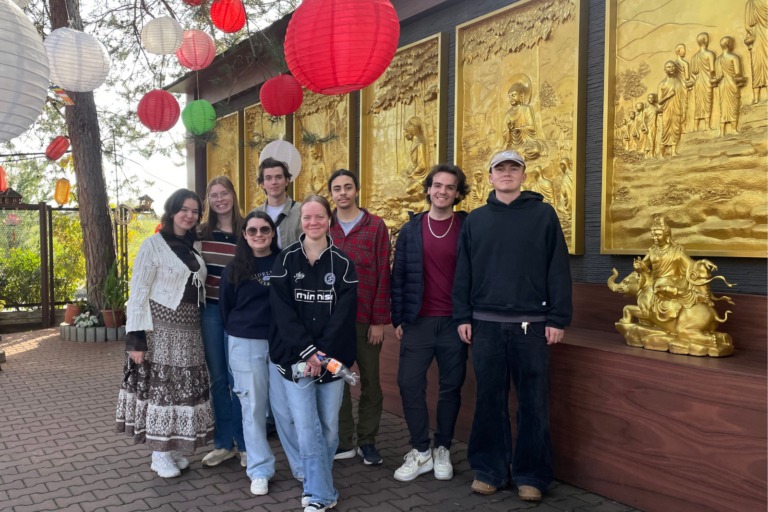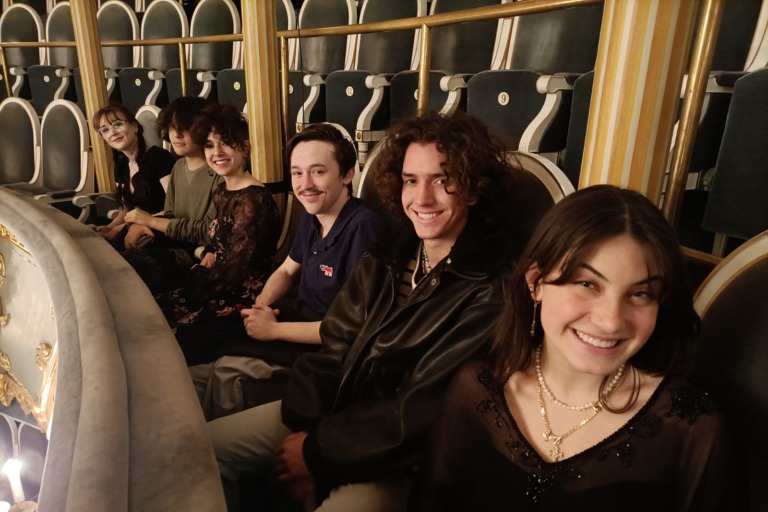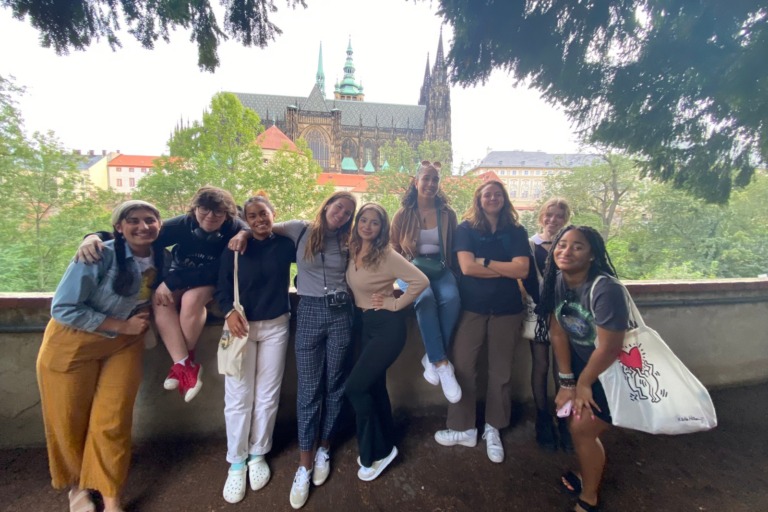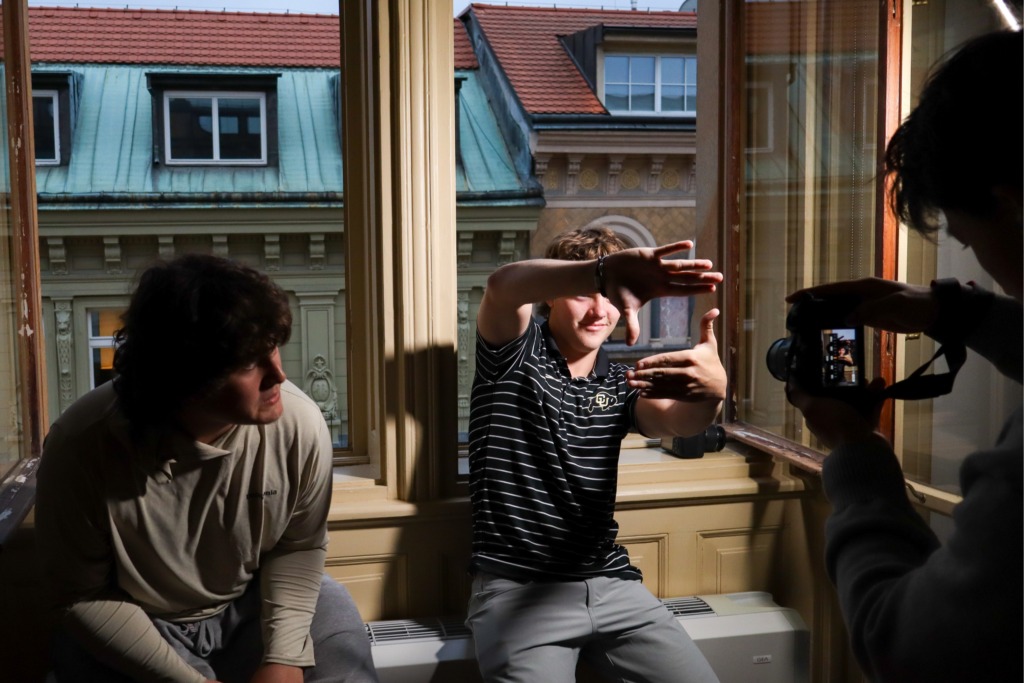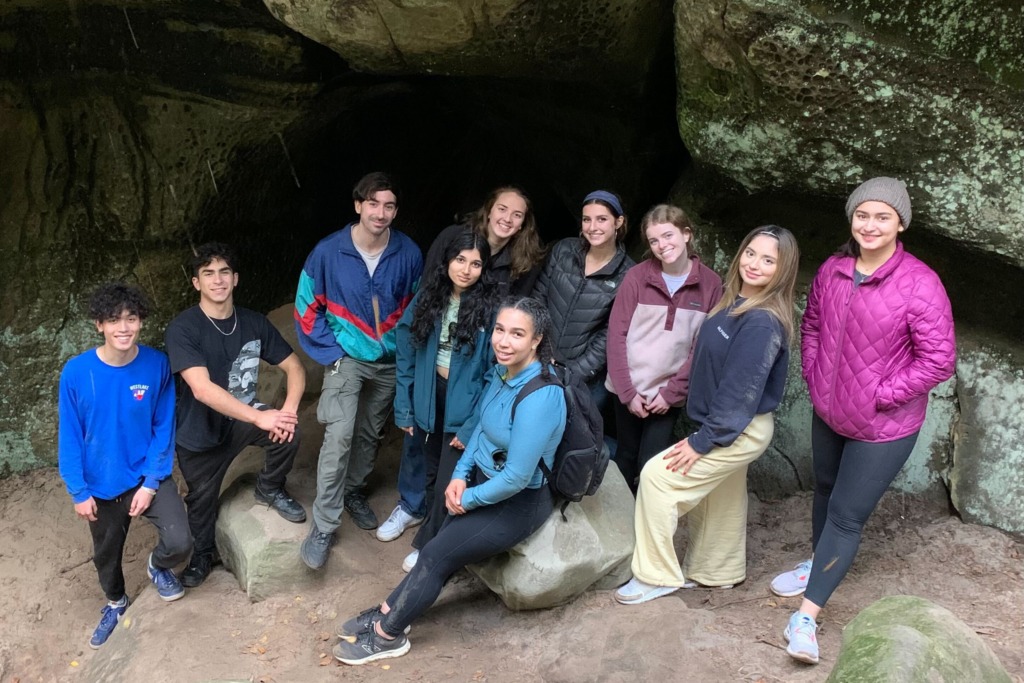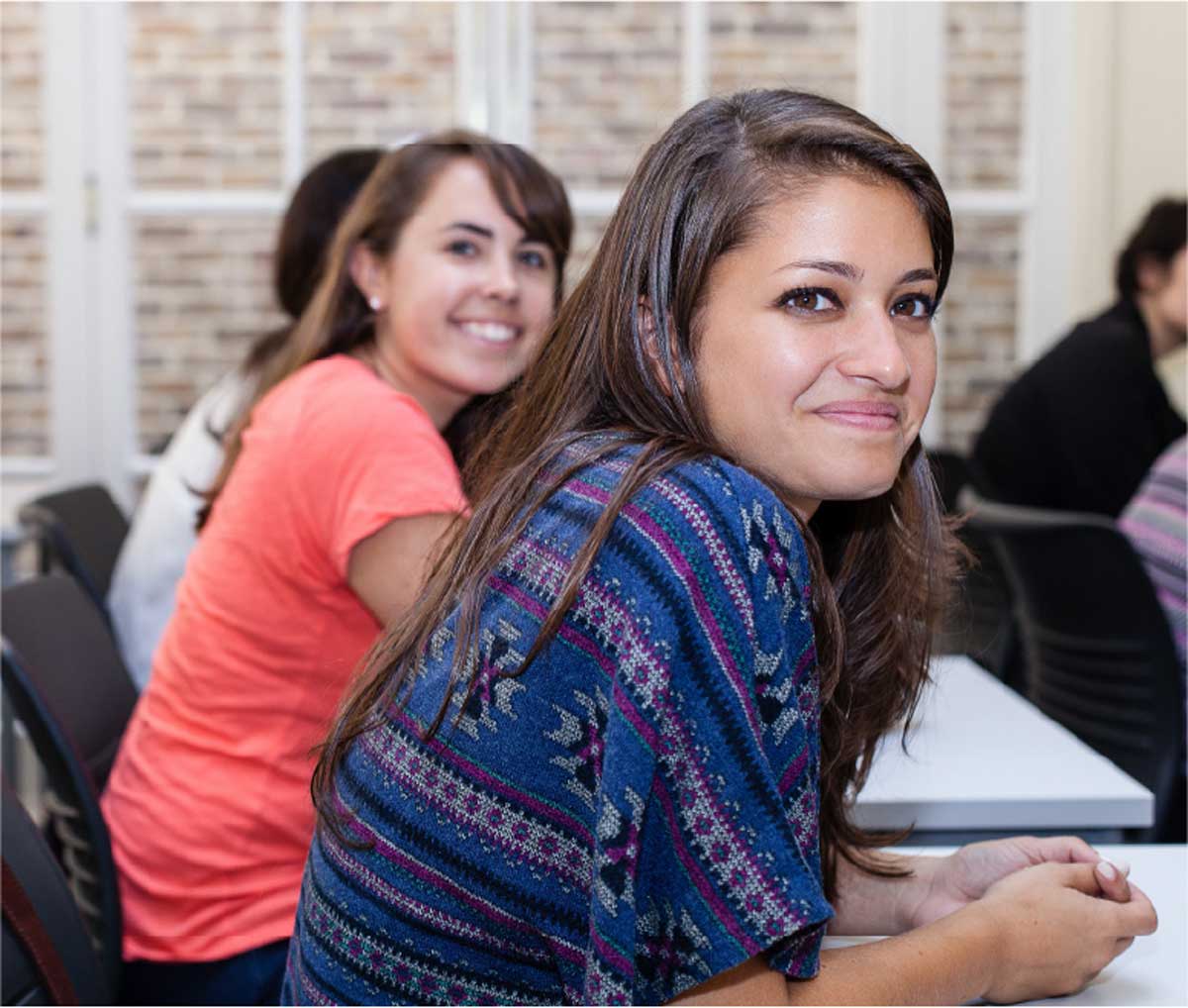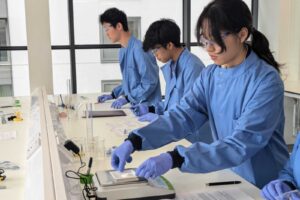
STUDY ABROAD IN
PRAGUE,
CZECH REPUBLIC
CHANGE YOUR WORLDVIEW in Prague, Czech Republic
Study abroad in Prague and immerse yourself in the charm of this historic city. From its stunning medieval architecture and rich cultural heritage to alluring cafés, scenic views, and fascinating street art scene — you’ll find it all.
Dates & Deadlines
- Spring ’26: Feb. 10 – May 9 (Enroll by 1/26/26)
- Fall ’26: Aug. 24 – Dec. 6 (Enroll by 6/1/26)
Requirements
- Must be 17 by the program start date
- Valid Passport
- Country-specific Visa (additional cost)
Program Cost
College Credits
- 12-17 Credits from our Academic Provider, the University of New Haven
Accommodations
- Student Residence or Apartment
WHAT WILL MY LIFE LOOK LIKE in Prague
Experience the magic of Prague, where every day brings new adventures. Start your mornings with a stroll through historic cobblestone streets, then dive into the city’s vibrant culture. Enjoy one-of-a-kind museums and iconic landmarks like Prague Castle and Charles Bridge, and explore the captivating and diverse neighborhoods.
Getting around Prague: Prague’s advanced public transportation makes exploring the city effortless. Whether by tram, metro, or bus, you’ll have easy access to all the city’s cultural and historical sites. As a student, you’ll also receive a transportation pass, making it even easier to get around.
Excursions & Activities
Possible Study Abroad Excursions:
Day Trips: Explore historic locations like Karlstejn Castle, Kutna Hora, or Terezín.
Overnight Trips: Enjoy an overnight adventure to Cesky Raj, Cesky Krumlov, or Karlštejn!
Cultural Experiences: Visit key monuments like the Prague Castle and the Charles Bridge.
Additional Activities: See an opera or ballet, attend a Czech national ice hockey game, or participate in a street art workshop.
Excursions are subject to change based on availability each semester, ensuring a dynamic and enriching experience.
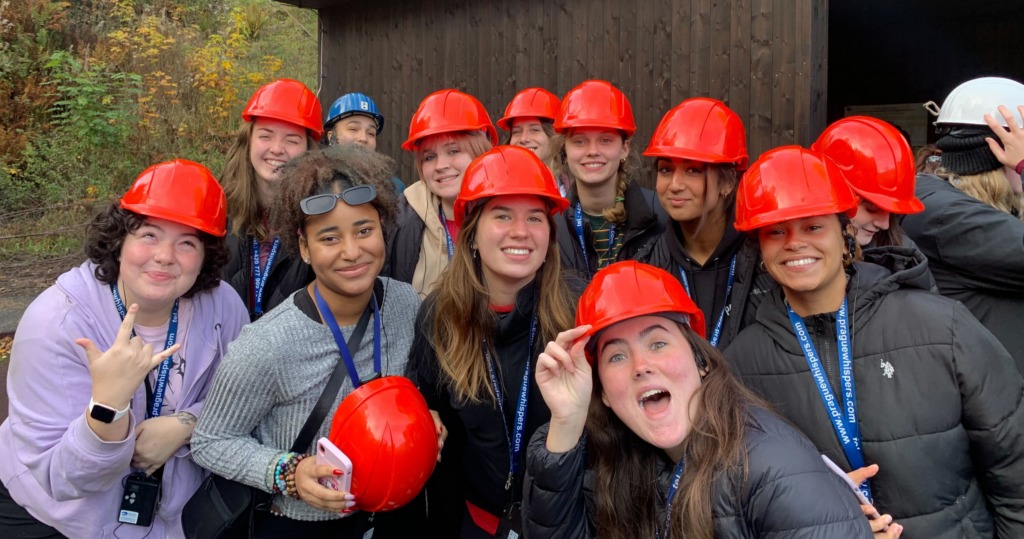
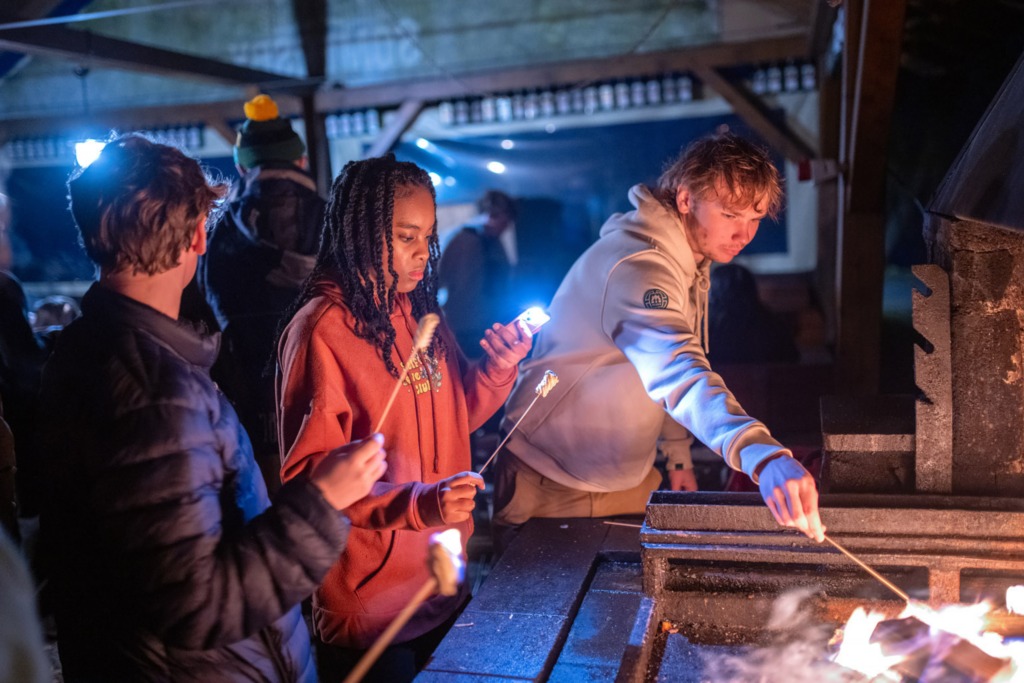
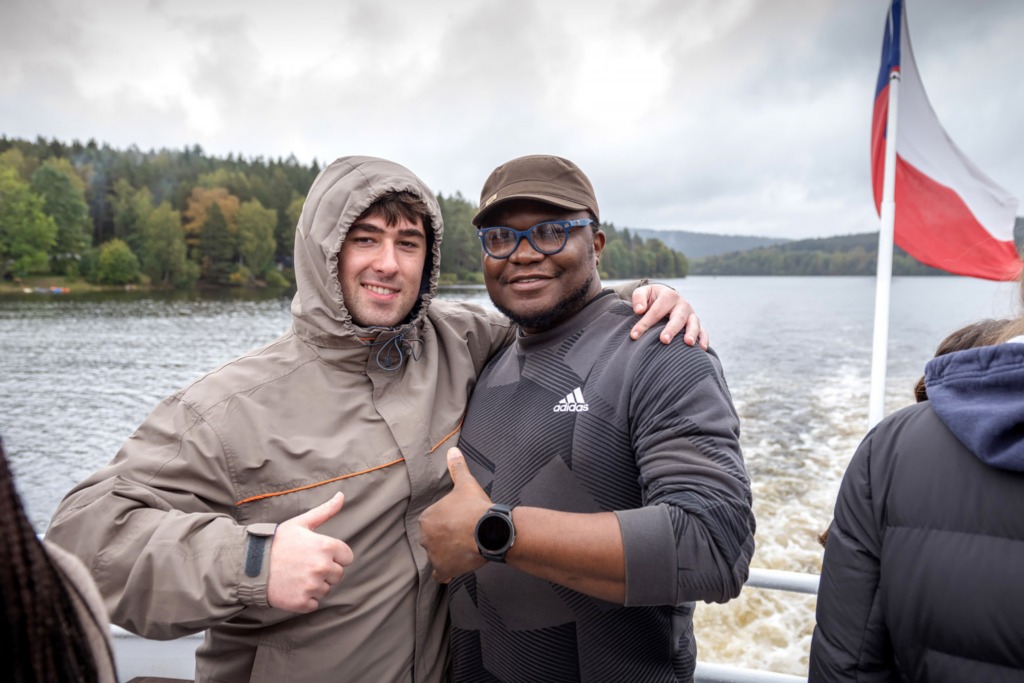
Accommodations
& Meals
Your Home in Prague
Vertoans will enjoy living in apartments or student residences within a walk or short bus ride to the study center.
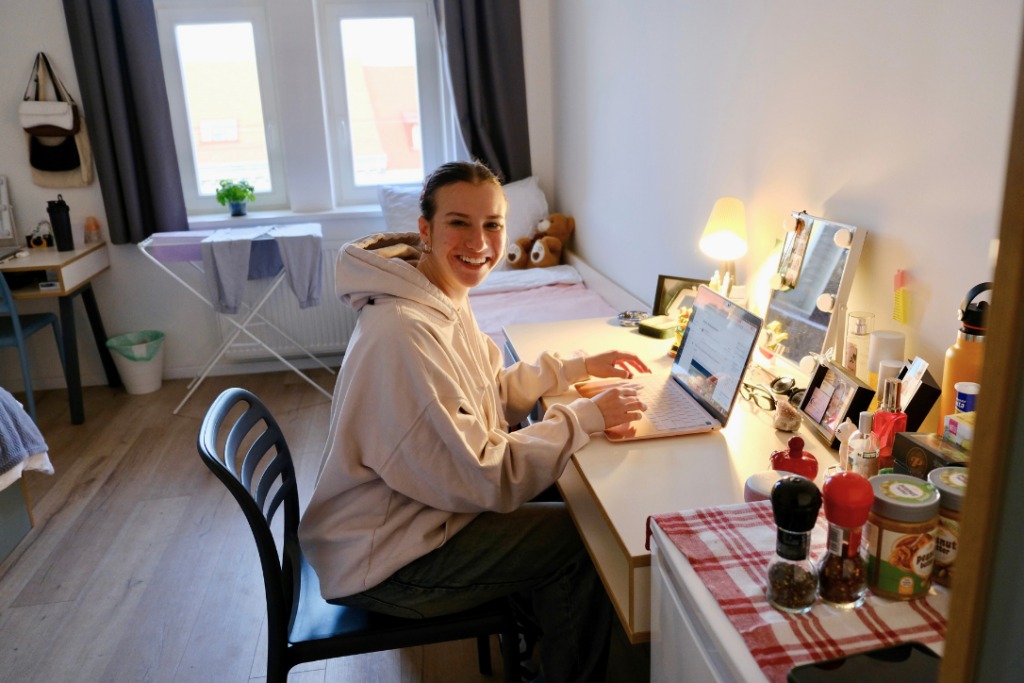
Verto Prague Study Center
Situated on the 5th floor of a beautiful historic bank, the Verto study center in Prague is located in Wenceslas Square and minutes from Old Town. This prime location allows you to easily walk to major attractions like the Astronomical Clock, Prague Castle, and bustling local markets. Its central placement means you’re always close to the action, whether it’s a cultural festival, a historic site, or a trendy café.
ACADEMICS in Prague
You’ll earn transferable college credits from Verto’s Academic Provider, the University of New Haven.
Verto’s Unique Academic Experience:
Small Class Sizes with Caring Professors: Enjoy personalized attention and engaging learning environments with an average classroom size of 16.
Excursions and Hands-On Learning Opportunities: Step outside of the classroom as you experience the culture and history of Prague through immersive activities.
Academic Support & Advising: Receive customized support to strengthen your academic skills, access resources like study groups and tutoring, and get 1:1 guidance on your journey to achieving your goals.
Prague Course Spotlight
*All classes at Verto locations are delivered by our accredited Academic Provider, the University of New Haven.
Course Information
Calculus I
The first year college course for majors in mathematics, science and engineering; and the basic prerequisite for all advanced mathematics. Introduces differential and integral calculus for functions of one variable, including algebraic and transcendental functions and culminates in the fundamental theorem of calculus. Includes basic rules and properties of limits and derivatives and applications of derivatives. Studies the plane analytic geometry needed for calculus.
Cultural Anthropology
A systematic study of the culture of preliterate and modern societies and of cultural change. Includes analyses of religion, economics, language, social and political organization and urbanization.
Diversity and Social Justice
Local and global communities are rapidly becoming more diverse. Social, technological, and economic changes bring us in close contact with individuals of backgrounds that are unique from our own. Successful engagement in this global society calls for greater reflection on our worldviews, challenging perceptions, developing empathy for others, and awareness of our biases and perceptions. Further, it also requires critical consumption and production of knowledge, stories, and data. This course will help students develop the tools to participate in diverse organizations, have productive—but courageous—conversations, determine what makes for good evidence, and apply evidence to the social world. Developing these critical and empathic skills will prepare students to thrive at the University in their other courses, student organizations, and high impact education opportunities, and to act as educated, purposeful, and civically engaged citizens within their communities.
Elementary Statistics
Topics include: basic probability theory; random variables and their distributions; estimation and hypothesis testing; regression; and correlation. This course is not calculus-based, and places an emphasis on an applied approach to statistical theory with applications chosen from the biological sciences and other fields of study. Students will be introduced to and make use of a computer package for data analysis.
Foundations for Success
Foundations for Success is a unique one-credit course designed with the purpose of guiding students through the transition between high-school and college life. With a focus on developing essential skills that are integral for success both in and beyond the classroom, this course will equip first-year students with the tools necessary to thrive academically, socially, and personally. Our holistic approach recognizes the importance of intellectual, emotional, social, ethical, and physical development, making this course a powerful tool for growth and self-awareness. Through interactive coursework, students will learn how to cultivate lifelong learning skills, foster community, build resilience, and achieve personal success at every level.
History of Art II
This course introduces students to works of art from the Renaissance period to the mid-20th century. The course explores the expressive, social, cultural, political, economic, and technological aspects of societies as reflected in their art.
International Relations
Forces and structures operating in the modern nation-state system, the foreign policy process, decision-making process, the impact of decolonization on traditional interstate behavior, economic and political developments since World War II.
Introduction to Art
This course introduces students to a range of studio art practices. The course explores materials, techniques, concepts, and methods in art making. Emphasis is placed on a foundational understanding and appreciation of the visual arts.
Introduction to Business Analytics w/ Lab
Students will obtain a solid introduction to R as a functional programming language and will be able to use Excel and R to effectively compute statistical and graphical procedures. Topics to be covered include descriptive statistics, plots and graphs for discrete and continuous data, statistical inference, regression, and selected non-parametrics including chi-square. In addition, power pivot and other Excel analytical tools will be covered.
Introduction to Business and Entrepreneurship
This course provides a framework for students to understand the decision-making processes, and related strategies, followed by an entrepreneur or business start-up. The course will introduce students to business fundamentals while they synthesize information from multiple sources to solve a business problem or opportunity. Students will use elements of design thinking and work in teams to design a business plan. Students will concurrently learn the language of business, while they build business communication skills.
Introduction to Criminal Justice
Survey of criminal justice system with emphasis on prosecution, corrections, and societal reaction to offenders. Retribution, rehabilitation, deterrence, and incapacitation serve as generic frames of reference and theoretical points of departure for analyzing the dispositional and correctional processes. The course focuses on the process - from the police and prosecution through the courts; from the courts through the correctional system.
Introduction to Digital Photography
This course is an introduction to the digital photographic process with an emphasis on the use of a manual camera as a tool for electronic photographic image making. The course will explore photography as a medium, critically examining the respective roles of technique, process, and methodology needed to produce creative artworks.
Introduction to Microeconomics
Microeconomics including markets and market structure and the allocation of resources. The distribution of income, the public economy, the international economy, and selected economic problems.
Introduction to Music
Basic forms and styles of music in the Western World; music appreciation.
Introduction to Philosophy
The nature of reality and how it may be known, according to the great thinkers of the West and the East.
Introduction to Physical Geology
This course explores the processes that are shaping Earth today. It examines the formation of rocks and mineral resources, the volcanic and tectonic activity that accompany release of Earth's internal heat, and the sculpting of the planet's surface that occurs as air, water and ice move in response to gravity and energy from the Sun. Lab activities include identification of rocks and minerals, interpretation of topographic and geologic maps, and field studies of regional geologic features.
Introduction to Psychology
This course will provide students with a basic understanding of psychology as a science. It will introduce students to research methods, principles of learning, development, biological bases of behavior, psychological disorders, and social psychological phenomena. Additional topics may include cognition, sensation and perception, sleep, intelligence, and personality. Ethical issues within the field will also be examined.
Pre-Calculus
Topics include: polynomials; algebraic functions; plane analytic trigonometry; and properties of exponential, logarithmic, and trigonometric functions. This course offers the foundation needed for the study of calculus.
Principles of Communication
This course will cover competencies and skills necessary to effectively communicate in various settings. Specifically, the present course will address the role of verbal communication, nonverbal communication, identity, culture, and listening in multiple communicative contexts. Students will have the chance to structure, organize, develop, and present information in multiple settings. These communicative contexts include interviews, group discussions, conflict situations, and social media.
Principles of Marketing
The fundamental functions of marketing involving the flow of goods and services from producers to consumers. Marketing methods of promotion, pricing, product decisions, and distribution channels.
Quantitative Reasoning
Topics include: sets; basic logic; enumeration and elementary probability; mathematical applications of personal finance; and basic statistics.
Seminar in Academic Inquiry and Writing
This course introduces students to the conventions of academic writing and the habits of critical inquiry they will need in university courses and beyond. Students read and annotate texts on a topic (or topics) selected by the instructor, develop original avenues of inquiry through classroom discussion, and transform their questions into well-supported academic arguments. Assignment sequences incorporate opportunities for research, drafting, revision, editing, and reflection to help students find writing processes that can be replicated in future courses and workplace projects that require only polished work. Because different disciplines and career paths present different scenarios for critical thinking and writing, this course also teaches students how to adapt the conventions of academic inquiry to a variety of contexts.
Sociology
The role of culture in society, the person and personality; groups and group behavior; institutions; social interaction and social change.
World History Since 1945
Rationalizations for World War II and the debates of the Cold War shaped the world as we know it today socially, politically, and economically. This course takes a global perspective on changes in relationships among countries, between different groups of people, race and gender, economic backgrounds, etc. The specific events and areas under study will vary with the professor, but students will examine these changes through various primary and secondary sources and different forms of data, such as demographic, development, and economic studies.
Cultural Anthropology
A systematic study of the culture of preliterate and modern societies and of cultural change. Includes analyses of religion, economics, language, social and political organization and urbanization.
Elementary Statistics
Topics include: basic probability theory; random variables and their distributions; estimation and hypothesis testing; regression; and correlation. This course is not calculus-based, and places an emphasis on an applied approach to statistical theory with applications chosen from the biological sciences and other fields of study. Students will be introduced to and make use of a computer package for data analysis.
Foundations for Success
Foundations for Success is a unique one-credit course designed with the purpose of guiding students through the transition between high-school and college life. With a focus on developing essential skills that are integral for success both in and beyond the classroom, this course will equip first-year students with the tools necessary to thrive academically, socially, and personally. Our holistic approach recognizes the importance of intellectual, emotional, social, ethical, and physical development, making this course a powerful tool for growth and self-awareness. Through interactive coursework, students will learn how to cultivate lifelong learning skills, foster community, build resilience, and achieve personal success at every level.
History of Art I
This course introduces students to works of art from the Paleolithic to the Renaissance period. The course explores the expressive, social, cultural, political, economic, and technological aspects of societies as reflected in their art.
Introduction to Philosophy
The nature of reality and how it may be known, according to the great thinkers of the West and the East.
Introduction to Psychology
This course will provide students with a basic understanding of psychology as a science. It will introduce students to research methods, principles of learning, development, biological bases of behavior, psychological disorders, and social psychological phenomena. Additional topics may include cognition, sensation and perception, sleep, intelligence, and personality. Ethical issues within the field will also be examined.
Principles of Communication
This course will cover competencies and skills necessary to effectively communicate in various settings. Specifically, the present course will address the role of verbal communication, nonverbal communication, identity, culture, and listening in multiple communicative contexts. Students will have the chance to structure, organize, develop, and present information in multiple settings. These communicative contexts include interviews, group discussions, conflict situations, and social media.
Seminar in Academic Inquiry and Writing
This course introduces students to the conventions of academic writing and the habits of critical inquiry they will need in university courses and beyond. Students read and annotate texts on a topic (or topics) selected by the instructor, develop original avenues of inquiry through classroom discussion, and transform their questions into well-supported academic arguments. Assignment sequences incorporate opportunities for research, drafting, revision, editing, and reflection to help students find writing processes that can be replicated in future courses and workplace projects that require only polished work. Because different disciplines and career paths present different scenarios for critical thinking and writing, this course also teaches students how to adapt the conventions of academic inquiry to a variety of contexts.
Sociology
The role of culture in society, the person and personality; groups and group behavior; institutions; social interaction and social change.
Calculus I
The first year college course for majors in mathematics, science and engineering; and the basic prerequisite for all advanced mathematics. Introduces differential and integral calculus for functions of one variable, including algebraic and transcendental functions and culminates in the fundamental theorem of calculus. Includes basic rules and properties of limits and derivatives and applications of derivatives. Studies the plane analytic geometry needed for calculus.
Contemporary Social Problems
The major problems which confront the present social order, and the methods now in practice or being considered for dealing with these problems.
Cultural Anthropology
A systematic study of the culture of preliterate and modern societies and of cultural change. Includes analyses of religion, economics, language, social and political organization and urbanization.
Elementary Statistics
Topics include: basic probability theory; random variables and their distributions; estimation and hypothesis testing; regression; and correlation. This course is not calculus-based, and places an emphasis on an applied approach to statistical theory with applications chosen from the biological sciences and other fields of study. Students will be introduced to and make use of a computer package for data analysis.
Entrepreneurship
Covers the entrepreneurial process from conception to operation of a new enterprise. Concentrates on the characteristics of entrepreneurs and the process by which they turn creative ideas into a new enterprise. The emphasis will be on how entrepreneurs can create value for themselves, their investors, their immediate communities, and other stakeholders.
History of Art I
This course introduces students to works of art from the Paleolithic to the Renaissance period. The course explores the expressive, social, cultural, political, economic, and technological aspects of societies as reflected in their art.
Introduction to Criminal Justice
Survey of criminal justice system with emphasis on prosecution, corrections, and societal reaction to offenders. Retribution, rehabilitation, deterrence, and incapacitation serve as generic frames of reference and theoretical points of departure for analyzing the dispositional and correctional processes. The course focuses on the process - from the police and prosecution through the courts; from the courts through the correctional system.
Introduction to Macroeconomics
Foundations of economic analysis, including economic progress, resources, technology, private enterprise, profits, and the price system. Macroeconomics including national income, employment, and economic growth. Price levels, money and banking, the Federal Reserve System, theory of income, employment and prices, business cycles and problems of monetary, fiscal, and stabilization policy.
Introduction to Philosophy
The nature of reality and how it may be known, according to the great thinkers of the West and the East.
Introduction to Physical Geology
This course explores the processes that are shaping Earth today. It examines the formation of rocks and mineral resources, the volcanic and tectonic activity that accompany release of Earth's internal heat, and the sculpting of the planet's surface that occurs as air, water and ice move in response to gravity and energy from the Sun. Lab activities include identification of rocks and minerals, interpretation of topographic and geologic maps, and field studies of regional geologic features.
Introduction to Psychology
This course will provide students with a basic understanding of psychology as a science. It will introduce students to research methods, principles of learning, development, biological bases of behavior, psychological disorders, and social psychological phenomena. Additional topics may include cognition, sensation and perception, sleep, intelligence, and personality. Ethical issues within the field will also be examined.
Management and Organization
A study of management systems as they apply to all organizations. Managerial functions, principles of management, and other aspects of the management process are examined.
Principles of Communication
This course will cover competencies and skills necessary to effectively communicate in various settings. Specifically, the present course will address the role of verbal communication, nonverbal communication, identity, culture, and listening in multiple communicative contexts. Students will have the chance to structure, organize, develop, and present information in multiple settings. These communicative contexts include interviews, group discussions, conflict situations, and social media.
Principles of Marketing
The fundamental functions of marketing involving the flow of goods and services from producers to consumers. Marketing methods of promotion, pricing, product decisions, and distribution channels.
Seminar in Academic Inquiry and Writing
This course introduces students to the conventions of academic writing and the habits of critical inquiry they will need in university courses and beyond. Students read and annotate texts on a topic (or topics) selected by the instructor, develop original avenues of inquiry through classroom discussion, and transform their questions into well-supported academic arguments. Assignment sequences incorporate opportunities for research, drafting, revision, editing, and reflection to help students find writing processes that can be replicated in future courses and workplace projects that require only polished work. Because different disciplines and career paths present different scenarios for critical thinking and writing, this course also teaches students how to adapt the conventions of academic inquiry to a variety of contexts.
INCLUDED WITH Your Experience
We recommend budgeting $350-600 USD per month for personal expenses. Your budget will mostly depend on your spending habits, especially for independent travel.
Talk to your family about budgeting expectations before you arrive. You don’t want to blow your whole budget on chimney cakes! (Or do you…?!)
Included With Your Study Abroad Program
- All accommodation while overseas
- Prepaid meal card to use at grocery stores, cafes, and restaurants
- All activities, excursions, and events
- Books and other course materials
- Travel medical insurance
- Airport pickup on the designated arrival date
- Public transit pass
- 24/7 Emergency assistance
International airfare, change fees, visa, and passport fees not included.
Check out these Vertoan’s tips on keeping to your budget while abroad!
On-Site Support
We’ll walk alongside you every step of your study abroad journey. From pre-departure guidance and virtual workshops to on-site mentorship, academic support, and community-building activities, we ensure you have the support you need for an enriching experience abroad. Plus, our team is here to help with your college planning and life after Verto, providing personalized advice and transfer support to set you up for future success. Learn more about student support here!
Scholarships & Institutional Aid
Verto is committed to increasing equity, access, inclusion, and diversity in study abroad and higher education — regardless of your financial background.
About half of Verto participants receive scholarships, institutional aid, or both. For eligible participants, Verto can significantly reduce the cost through Verto’s Opportunity Grant. You can also apply for external grants and scholarships to further reduce your study abroad cost.
How to Apply to Verto Prague
The first step is to fill out our free study abroad application. There’s no obligation and it only takes a few minutes to complete the online form.
After your application is submitted, you’ll be matched with a counselor who can answer any and all of your questions. Ready to get started?

